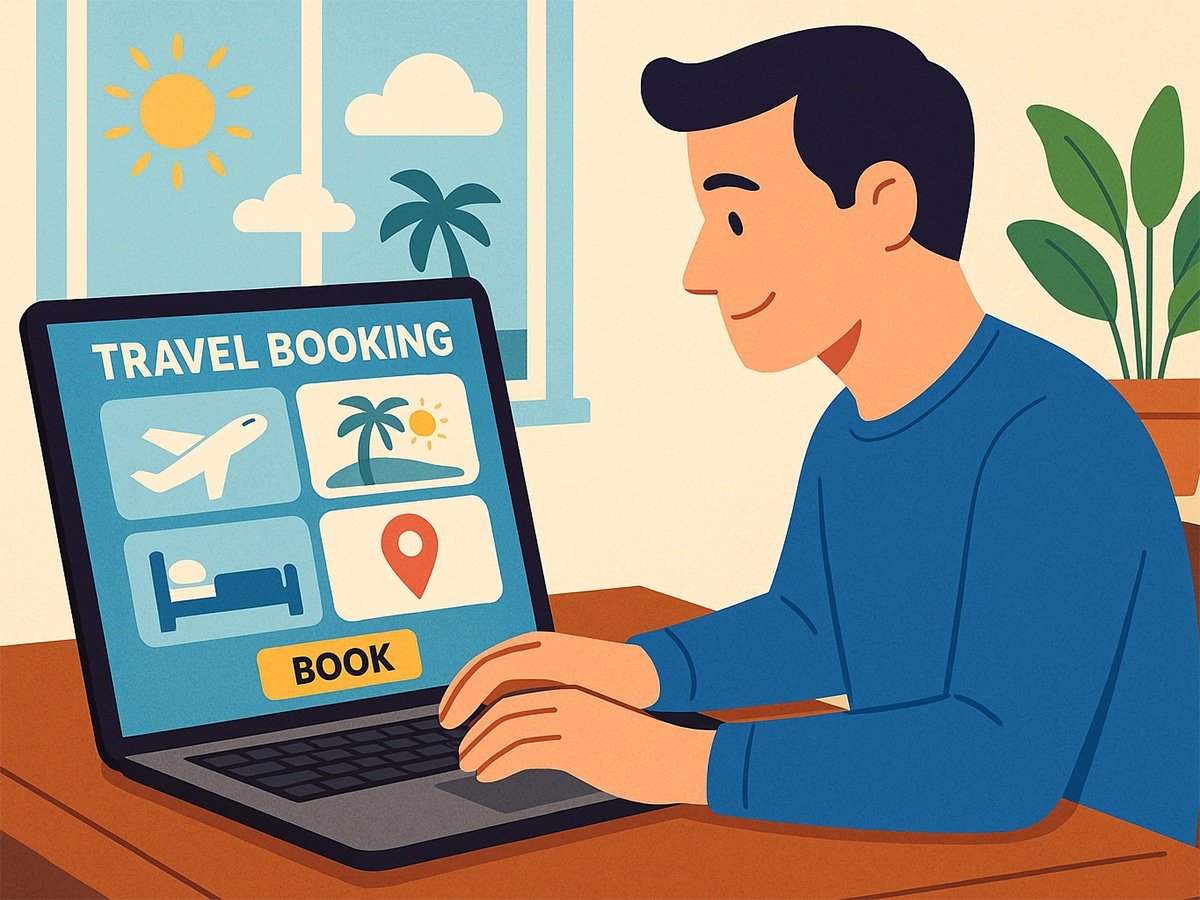This post contains references to products from one or more of our advertisers. We may receive compensation when you click on links to those products. For an explanation of our Advertising Disclosure, visit this page.
Planning a vacation should be exciting, not stressful. But scammers are now using advanced AI tools to target travelers with phishing scams that look more real than ever. According to Tony Anscombe, Chief Security Evangelist at ESET, cybercriminals are getting smarter, faster and more convincing, all thanks to generative AI.

Here’s what’s happening, how to spot red flags and what simple habits can keep your vacation (and your wallet) safe.
AI-Powered Scams: Too Good to Be True? Probably.
“Scammers are leveraging AI tools to craft high-quality phishing campaigns that include emails with highly realistic content and graphics,” says Anscombe. These scams often mimic airline or rental websites and show up in emails, ads or search results, offering deals that feel impossible to pass up.
Using real data, like actual flight schedules or typical hotel rates, AI helps scammers create listings that look almost indistinguishable from the real thing. “These fraudulent campaigns often promote unrealistically low prices for flights, urging users to book immediately to secure the deal,” Anscombe explains. “It’s this sense of urgency and the lure of a bargain that often leads victims to fall for the scam, driven by adrenaline and fear of missing out.”
Red Flags in Ads, Messages and Websites
If a deal seems off, it probably is. Ads or emails that push you to “act now” or “book before midnight” might be fishing for your personal and financial info. The safest move? Avoid clicking on links in emails or ads, even if they look legitimate. Instead, open your browser and manually type in the web address of a trusted travel platform.
“While a low-cost cottage rental might be tempting, bypassing official platforms can eliminate important protections and expose you to fraud,” Anscombe warns.
Also, stay cautious of “sponsored” links at the top of your search engine results. Those are often paid placements and may not be what they seem.
Smart Steps to Verify Listings
Ever found a dreamy vacation rental at half the price of anything else? That’s your cue to be skeptical. A great way to check is by doing a reverse image search of the listing photos. “This can reveal if the same image is used in listings for multiple locations under different names—an almost certain sign of a scam,” says Anscombe.
And always double-check the web address. Scammers love lookalike domains that swap in a letter or add a symbol to fool you. “If anything looks suspicious or misspelled, close the site immediately.”
Don’t Pay Like a Scammer Would
If someone’s asking you to pay for a flight or rental using cryptocurrency, gift cards or money apps like Venmo, stop right there. “Legitimate travel companies do not request payment via cryptocurrency, gift cards or money transfer apps,” Anscombe explains.
Stick to credit cards or secure digital wallets like Apple Pay or Google Pay, which offer fraud protection. And in general, avoid debit cards for online purchases. They pull directly from your bank account and offer fewer safety nets.
Cybersecurity Habits for Smarter Travel
Whether you’re heading to Europe or a weekend road trip, a few tech tweaks before you go can keep your data safe:
Before You Leave:
Back up your data. If your laptop gets lost or stolen, your memories and files won’t go with it.
Leave sensitive documents at home. No need to carry everything with you.
Disable data roaming and set up an eSIM with a local provider if you’re going overseas.
Install a VPN on your devices to encrypt your data when using WiFi.
Update your security software so you’re protected with the latest patches.
While You’re Traveling:
Watch your screen. “That person behind you on the plane or in the coffee shop has direct visibility of your screen,” Anscombe says. Be aware of your surroundings. Consider using a privacy screen for your laptop, which will shield whatever is on your computer screen from prying eyes.
Don’t blindly trust public WiFi. Always verify with a manager before connecting and use a VPN when possible. “Tools to snoop are readily available and easy to use, making this a real threat.”
Avoid handling sensitive transactions in public places. If you can wait until you’re in your hotel, or even better, back home, do it.
Use credit cards for any must-do bookings while on the road. They add a layer of protection you won’t get with other payment methods.
Enjoy Your Trip. Just Do It Smartly
The bottom line? Scammers are getting slicker but with a few precautions, you can keep your trip smooth and stress-free. Bookmark this article before your next getaway and remember: when it comes to unbelievable travel deals, if it looks too good to be true, it probably is.
KEEP READING
–Did you know your electronic devices should always be charged when going through security?
–The travel gadget flight attendants never leave home without
–Going on a cruise? Be sure to bring this
–The genius phone hack to try when your plane doesn’t have an in-flight entertainment system
–Travel hack: How to use your wireless headphones to watch in-flight movies
Want more travel news, tips and deals? Sign up to Johnny Jet’s free newsletter and check out these popular posts: The Travel Gadget Flight Attendants Never Leave Home Without and 12 Ways to Save Money on Baggage Fees. Follow Johnny Jet on MSN, Facebook, Instagram, Pinterest, and YouTube for all of my travel posts.



